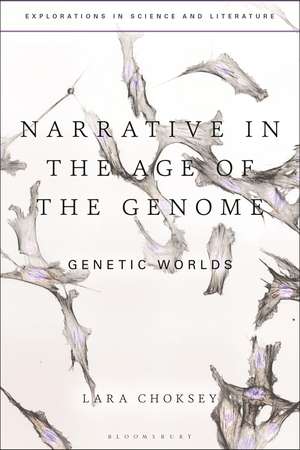Narrative in the Age of the Genome: Genetic Worlds: Explorations in Science and Literature
Autor Dr Lara Chokseyen Limba Engleză Hardback – 10 feb 2021
| Toate formatele și edițiile | Preț | Express |
|---|---|---|
| Paperback (1) | 197.52 lei 43-57 zile | +72.78 lei 5-11 zile |
| Bloomsbury Publishing – 24 aug 2022 | 197.52 lei 43-57 zile | +72.78 lei 5-11 zile |
| Hardback (1) | 568.80 lei 43-57 zile | |
| Bloomsbury Publishing – 10 feb 2021 | 568.80 lei 43-57 zile |
Preț: 568.80 lei
Preț vechi: 815.94 lei
-30% Nou
Puncte Express: 853
Preț estimativ în valută:
108.84€ • 113.94$ • 90.06£
108.84€ • 113.94$ • 90.06£
Carte tipărită la comandă
Livrare economică 07-21 aprilie
Preluare comenzi: 021 569.72.76
Specificații
ISBN-13: 9781350102545
ISBN-10: 1350102547
Pagini: 232
Dimensiuni: 156 x 234 mm
Greutate: 0.5 kg
Editura: Bloomsbury Publishing
Colecția Bloomsbury Academic
Seria Explorations in Science and Literature
Locul publicării:London, United Kingdom
ISBN-10: 1350102547
Pagini: 232
Dimensiuni: 156 x 234 mm
Greutate: 0.5 kg
Editura: Bloomsbury Publishing
Colecția Bloomsbury Academic
Seria Explorations in Science and Literature
Locul publicării:London, United Kingdom
Caracteristici
Includes innovative new readings of texts by writes such as Ursula Le Guin, Michael Crichton, Octavia Butler, Kazuo Ishiguro and Margaret Atwood
Notă biografică
Lara Choksey is a Research Fellow at the Wellcome Centre for Cultures and Environments of Health at the University of Exeter, UK.
Cuprins
Acknowledgements Introduction Chapter 1: Deindustrialisation and the Selfish Gene Gene and StrikeOverpopulation and Whiteness: Doris Lessing's The Memoirs of a SurvivorBrackets and Choice: Samuel Delany's Trouble on Triton Chapter 2: Cultivating Dreamworlds Mutual AidCultivating HumansThe Fifth Problem: Boris and Arkady Strugatsky's Roadside Picnic Genogeography: Kir Bulychev's "Another's Memory" Chapter 3: Memoir and the Laboratory Metaphors of the Human Genome ProjectWelfare, Profit, and the Vitruvian ManEnding Development: Kazuo Ishiguro's Never Let Me GoAlgorithmic Governmentality in Andrew Niccols's Gattaca Chapter 4: Speculative Ancestry Ancestry MakingGenre, Genetics, and GenealogyHenrietta Lacks and Stolen FleshReparation, Romance, and KinlessnessLeaving: Saidiya Hartman's Lose Your MotherStaying: Yaa Gyasi's Homegoing Chapter 5: Toxic Infrastructure Chernobyl and the Postgenomic ConditionAdaptation, Improvisation, and EpigeneticsMutation and Fragmentation: Svetlana Alexievich's Chernobyl PrayerTransitional Characterisation: Jeff VanderMeer's Southern Reach trilogy Conclusion: Disappearance, community, characterisation, genre, and scale Works Cited Index
Recenzii
Imbued throughout with deep concern for the peripheral, the possible, and the political . What emerges as most compelling out of this entire tapestry of readings is the author's interpretation of the limits and failures of the extraordinary 'cultural power of the genome.'
Intellectually rich and rewarding, this study ranges effortlessly across the fields of biology, socio-economic theory and philosophy, drawing on these perspectives to forge novel readings of a range of literary texts. Imaginative and astute in its reflections on genre and narrative form, it is beautifully written throughout. The argument is bold and original, grounded in rigorous research and always attentive to the specific biosocial contexts it explores.
Intellectually rich and rewarding, this study ranges effortlessly across the fields of biology, socio-economic theory and philosophy, drawing on these perspectives to forge novel readings of a range of literary texts. Imaginative and astute in its reflections on genre and narrative form, it is beautifully written throughout. The argument is bold and original, grounded in rigorous research and always attentive to the specific biosocial contexts it explores.










